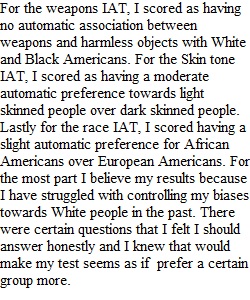


Q According to the Kirwan Institute for the Study of Race and Ethnicity, implicit bias, which is also known as implicit social cognition, refers to the attitudes or stereotypes that can influence our understanding, actions, and decisions in an unconscious manner. Since these biases are involuntarily initiated, the individual is, therefore, unaware and does not have intentional control, as these biases reside deep in an individual’s subconscious. Unlike known biases, which most individuals conceal for the purposes of social and/or political correctness, implicit biases are not accessible through self-reflection. The implicit biases that we harbor deep within our subconscious govern the feelings and attitudes that we hold of others based predominantly on personal characteristics such as one’s race, ethnicity, age, and even appearance. Implicit biases are thought to develop from a culmination of lifetime exposure to both direct and indirect messages garnered from our personal experiences with those around us, including the news media. The bad news is that EVERYONE has them, even though they might not align with our outward beliefs. This means that implicit biases, particularly racial biases, exist within our law enforcement officers, court personnel, social workers and corrections employees, and such biases can have a profound negative influence on our real-world behaviors. Surprisingly, very little has been published on implicit bias and its influence on criminal justice professionals’ subconscious perceptions of others and how such biases could lead us to target certain individuals based on their race, ethnicity, age, or physical appearance. One of the most widely cited studies on this topic, Correll and colleagues concluded that when police officers and civilians were confronted with making a split-second decision to shoot black or white suspects in an interactive video, both police officers and community members were quicker to shoot black people with guns compared to white people with guns, and they took longer when deciding against shooting the unarmed black suspects than the unarmed white suspects. (It should be noted that some of the suspects were holding a gun, whereas others were holding random objects, such as a cell phone or wallet.) This was true regardless of whether the officer or civilian pulling the trigger was white or black. Correll and colleagues’ findings suggests that our attitudes and behaviors towards others are often driven by our subconscious thoughts. It is thought that these implicit biases stem from our evolutionary proclivity to be cautious of others who are unfamiliar or different from us. The biases are often reinforced by culturally established stereotypes. Since implicit biases exist within our subconscious, they are especially difficult to control and can have dire consequences for criminal justice professionals tasked with enforcing the law. For instance, black men are significantly more likely to be stopped and questioned by the police and subsequently arrested, and far more likely to receive a harsher sentence in comparison to white men. This is also true for black women, who are four times more likely than white women to be sentenced to prison and for a longer term. Research also supports the fact that black men are twice as likely to be sentenced to death for capital crimes in comparison to white males. Consider your own biases. Before adding to this conversation, take time to acknowledge how your own biases may influence your perceptions of the events or issues at play. A good starting point can be assessing your implicit attitudes through the Implicit Association Test (IAT). Take Implicit Association Test (IAT) (complete Race IAT, Skin Tone IAT, and Weapons IAT tests) and answer the following questions: 1. What were your IAT results? 2. Do you believe your results were accurate? Why or why not? 3. What was your reaction when you learned your results? 4. Regardless of the IAT, do you think that you have hidden racial biases? What is your evidence? 5. In your opinion, how common are hidden racial biases, and how important are they compared with other racial biases?
View Related Questions